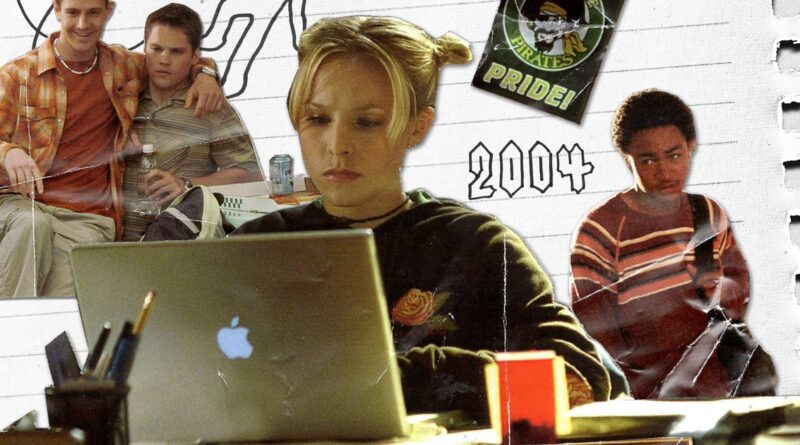Veronica Mars, Lost, and the internet’s takeover of TV
A lot has been said about TV in 2004. That it was the best year of television of all time, the peak of the Golden Age of television. Or maybe that it was the year reality television became too much, suddenly showing up on every channel as we flipped the switch. But as famed Hollywood producer and UFO enthusiast Bryce Zabel wrote for the Los Angeles Times in 2004, it was the end of television as we knew it. He chalked it up to the prevalence of TiVo and DVR in American households and predicted an upheaval so severe the whole advertising business would crumble — and he didn’t even know about streaming yet.
The shift was one that a lot of people felt in real time. For many, it was through the show Lost, which debuted in 2004 and created a fervor among obsessives trying to understand the show’s central mysteries. For me, it was a smaller but equally influential show: Veronica Mars.
In true early aughts fashion, for me, it was an AIM away message that started it all: “BRB Watching Veronica Mars.” It was the days before one could text or doomscroll while watching TV, and setting a solid away message while you stepped away from the family computer to watch a show was key. Earlier that day, in school, my friends and I had been discussing the previous episode in anticipation like we did every week, dissecting the storylines and proposing our own theories of who-done-it (no spoilers here — if you haven’t seen it, watch it!). I came back to the computer during one of the commercial breaks, and there was a message from my friend with a link to Television Without Pity’s latest Veronica Mars recap, with the caption “DID YOU SEE THIS?” In that particular recap, the author Couch Baron had made the same joke I made to her earlier that day almost word by word. I clicked.
The recap was long, thorough, and meant to catch TiVo-less fans up on what they missed the previous week. Reading through it, though, I felt like the writer was one of my friends who I discussed the show with, only he was funnier than us and could go on for pages and pages offering context, theories, and Easter eggs we would never think of. I was hooked. Not only did I have to watch Veronica every Wednesday night at 9PM — my parents did not splurge on TiVo — but I had to read Couch Baron’s recap as soon as it went live. The TWoP recaps opened a window to a community I didn’t know existed. A world of comment sections and forums, fan theories, ships (before they were called ships), music credits (I see you, Tegan and Sara), and production gossip. Like Veronica Mars herself, people on the internet were sleuths, collectively investigating and chipping into answers to the show’s biggest questions and mysteries.
And TWoP also recaps for basically all other shows on TV. The biggest was Lost, an instant network hit that had its own dedicated crop of TWoP recaps and forum threads discussing the Smoke Monster, the meaning of “see you in another life, brother,” and other oddly specific breadcrumbs that the show’s creators had left for its rabid fan base. It was thanks to the internet that I learned that “Make Your Own Kind of Music” was a ’60s hit song by Cass Elliot so I could illegally download it on Kazaa. TWoP and The AV Club had been around for years before 2004, but these two shows heralded the user-curated TV boom that would soon follow. Just a year after Lost premiered, Lostpedia launched. For the 2006 season, TV wikis would become ubiquitous. By the time the finale aired in 2010, live tweeting was a thing, and we all collectively held our breath as we watched together on social media.
Unlike Lost, Veronica Mars ended up getting canceled after only three seasons. It aired on the CW and succumbed to poor ratings, but not because of fans’ lack of trying. We called ourselves Marshmallows (a reference to the show’s pilot) and tirelessly pleaded with audiences and executives to keep it alive. While our efforts did not prevail in keeping the show from getting canned, it was the fandom built in 2004 that backed an eventual movie sequel on Kickstarter years later.
Watching TV for me was always about community, and in 2004, I found one that was so much bigger than the people I saw every day. It was then — before streaming even existed and before Facebook statuses and tweets were around to allow us to share our every thought — that watching television on the internet together was born. And now we’re here; appointment TV has been replaced by streaming subscriptions, and viral memes and celebrity press tours have taken over our algorithms. Wikis and forums are still around, but it’s not the same. It’s all bigger somehow — the internet is bigger — and being an adult is more time-consuming. The cozy insulated TV communities of 20 years ago might be a relic of the early 2000s, when the internet offered so much possibility but was small enough to make magic.





